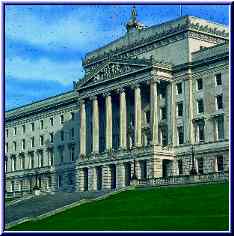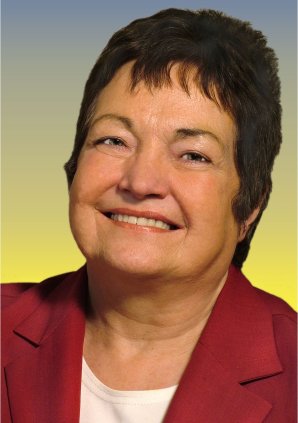 The campaign to
establish a Minister for Peace within the Northern Ireland Executive,
as a step towards a full Ministry for Peace, has been launched at Stormont, the seat of the Northern
Ireland Assembly.
The campaign to
establish a Minister for Peace within the Northern Ireland Executive,
as a step towards a full Ministry for Peace, has been launched at Stormont, the seat of the Northern
Ireland Assembly.
Welcoming the initiative, Alliance Party leader David Ford MLA
introduced the driving force behind the campaign, Nobel Peace Laureate
Mairead Corrigan Maguire. Mairead was supported in person by fellow
Laureate Jodi Williams, and from afar by the Nobel Peace Women.
As Jodi explained, there have been only twelve female Nobel Peace laureates in its more than 100-year history and seven of them are living now - in addition to her and Mairead, they are Betty Williams, Wangari Maathai, Shirin Abadi and Rigoberto Menchu. Only Aung San Suu Kyi has been unable to join as she is still under arrest in Burma.
Mairead explained that the campaign has been launched because N Ireland is, in many ways, even more divided now than during the violence of the Troubles. There is a pressing need for a sustained programme of reconciliation and healing, coordinated at Executive level by a Minister for Peace.
 Mairead and Jodi
Mairead and Jodi 
Jodi suggested that the title 'Minister for Peace' might not be understood by some people and might even conjure up images of 'tree-hugging wimpiness'; but from her experience 'peace is very hard work'. Her successful campaign to ban land-mines and the current campaign to ban cluster weapons have demanded enormous effort, commitment and stamina.
Also speaking was Eddy Canfor-Dumas, Chair of ministry for peace uk, who offered a historical and global perspective on the campaign. The first Department of Peace was proposed more than two hundred years ago by Benjamin Rush, one of the Founding Fathers of the US constitution. The Global Alliance for Ministries and Departments for Peace currently embraces civil society organisations, committed citizens and elected and appointed government officials from 35 countries and regions (and is growing all the time).
Most importantly, the idea is becoming a reality. The Office of the Presidential Adviser on the Peace Process in the Philippines (in effect a Ministry for Peace) was established in 2001. A Ministry of National Unity, Reconciliation, and Peace was established in the Solomon Islands in 2002; and a Ministry for Peace and Reconstruction was established in Nepal in March 2007. So there are clear precedents that could be followed and adapted to the needs of N Ireland.
The organisation that Mairead represents, The Peace People, published this statement to coincide with the launch, which was covered widely by the media in N Ireland and Eire:
Conflict transformation by peaceful means
The
Peace People applaud the re-establishment of our Assembly at Stormont,
and recognise that it is one of the signs of real hope for a change to
a new culture of peace and reconciliation.
Weary of the endless violence that sadly is so much part of the
fabric of our society and world, many in Northern Ireland are seeking
ways to create a more sustainable peace.
The Peace People,
therefore, believe that the time is now right for making a NI Executive
Minister within the the Office of the First and Deputy First Minister
responsible for sustaining the growth of a peaceful and non-violent
society in Northern Ireland.
The Minister for Peace would be responsible for ensuring that all
Executive policies are proofed to ensure that they comply with an
agreed agenda for peace and reconciliation.
This initiative
would require minimal resources and would complement existing policies,
such as those targeting social need and conflict transformation.
However, it would help create a coordinated and
coherent paradigm within the policy making process for a sustainable
peace in Northern Ireland. It would be part of the creation of a new
architecture of peace that is urgently needed to solve the problems of
21st Century conflict and violence both at home and abroad.
Creating a Minister for Peace would establish Northern Ireland's
role as a global peacemaker and peace builder, and a world leader in
the work of peace and reconciliation.
Seven priorities for NI Executive Minister for Peace
With a view to initiating debate we offer the following for further discussion:
1)
Address the root causes and consequences of violence in society and
recognise that these are manifest in many areas such as poverty,
education, health, housing, and the environment.
2) Create a more sustainable and balanced economy, based on a
policy of ethical investment, which addresses disparities in the
distribution of wealth and inequalities in the workplace. Ensure that
our peace building efforts take full advantage of the opportunities for
sustainable development, notably long-term investments in
infrastructure and services.
3) Give Peace and Affective Education a more significant status in current education policy.
4)
Train community workers dedicated to helping achieve conflict
transformation within our society and thereby empower local communities
to develop their own models for peace and reconciliation.
5) When justice powers are devolved, transform prison policy to ensure the emphasis is on rehabilitation and education.
6) Lobby the UK Government to uphold its obligations under the Nuclear Non-Proliferation Treaty
7) Promote a culture of peace through community-based initiatives
that bring together groups and individuals from all sections of our
society. Move beyond violence and begin to create a community that
fosters engaged citizenship.
This initiative is inspired by the Charter for a World Without
Violence, formulated at the 8th World Summit of Nobel Laureates, whose
theme is encapsulated in its first line: 'Violence is a preventable
disease.' The Charter advocates a step-by-step approach to creating a
culture of nonviolence.
The campaign to establish a Minister for Peace within the Northern Ireland Executive was launched on 21 May 2008.
